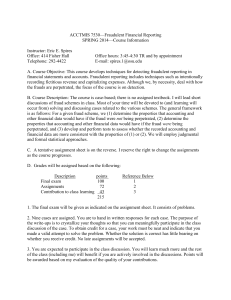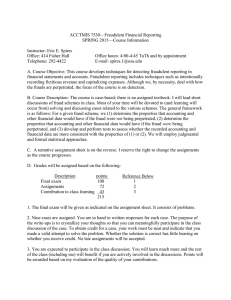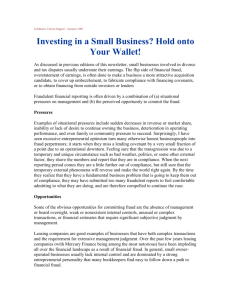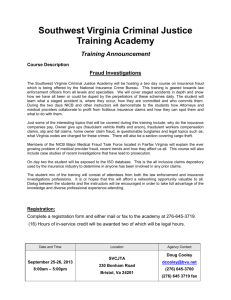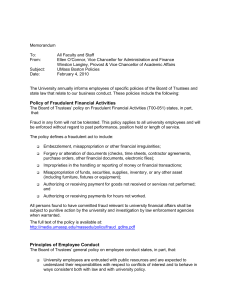METHODIST UNIVERSITY FRAUD POLICY
advertisement
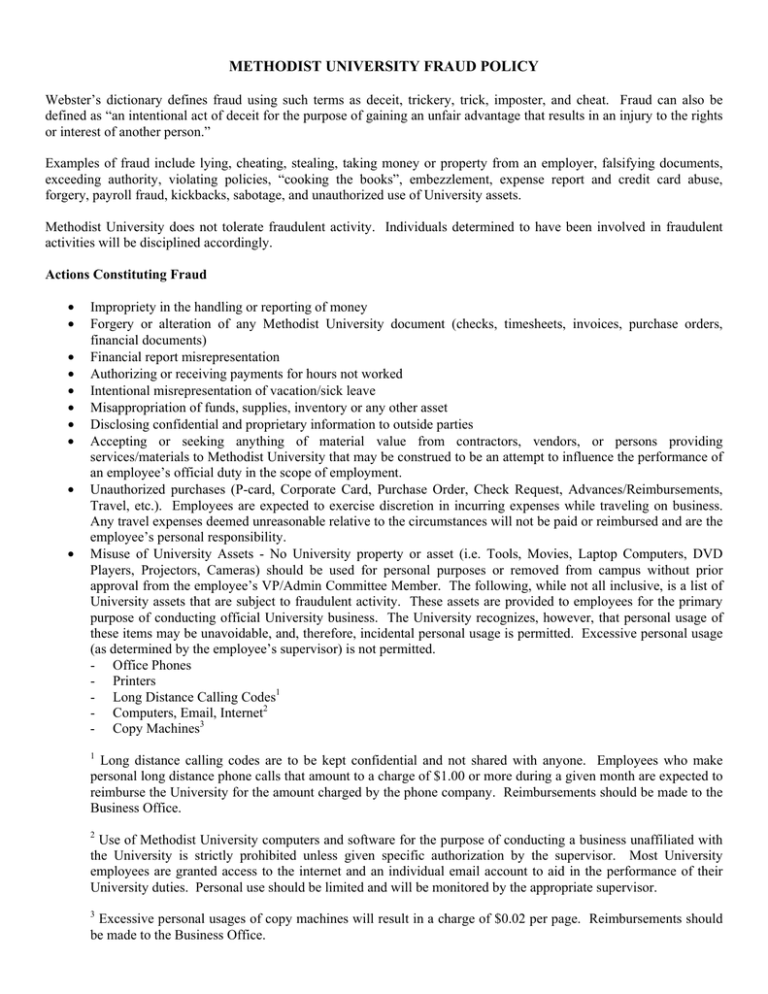
METHODIST UNIVERSITY FRAUD POLICY Webster’s dictionary defines fraud using such terms as deceit, trickery, trick, imposter, and cheat. Fraud can also be defined as “an intentional act of deceit for the purpose of gaining an unfair advantage that results in an injury to the rights or interest of another person.” Examples of fraud include lying, cheating, stealing, taking money or property from an employer, falsifying documents, exceeding authority, violating policies, “cooking the books”, embezzlement, expense report and credit card abuse, forgery, payroll fraud, kickbacks, sabotage, and unauthorized use of University assets. Methodist University does not tolerate fraudulent activity. Individuals determined to have been involved in fraudulent activities will be disciplined accordingly. Actions Constituting Fraud • • • • • • • • • • Impropriety in the handling or reporting of money Forgery or alteration of any Methodist University document (checks, timesheets, invoices, purchase orders, financial documents) Financial report misrepresentation Authorizing or receiving payments for hours not worked Intentional misrepresentation of vacation/sick leave Misappropriation of funds, supplies, inventory or any other asset Disclosing confidential and proprietary information to outside parties Accepting or seeking anything of material value from contractors, vendors, or persons providing services/materials to Methodist University that may be construed to be an attempt to influence the performance of an employee’s official duty in the scope of employment. Unauthorized purchases (P-card, Corporate Card, Purchase Order, Check Request, Advances/Reimbursements, Travel, etc.). Employees are expected to exercise discretion in incurring expenses while traveling on business. Any travel expenses deemed unreasonable relative to the circumstances will not be paid or reimbursed and are the employee’s personal responsibility. Misuse of University Assets - No University property or asset (i.e. Tools, Movies, Laptop Computers, DVD Players, Projectors, Cameras) should be used for personal purposes or removed from campus without prior approval from the employee’s VP/Admin Committee Member. The following, while not all inclusive, is a list of University assets that are subject to fraudulent activity. These assets are provided to employees for the primary purpose of conducting official University business. The University recognizes, however, that personal usage of these items may be unavoidable, and, therefore, incidental personal usage is permitted. Excessive personal usage (as determined by the employee’s supervisor) is not permitted. - Office Phones - Printers - Long Distance Calling Codes1 - Computers, Email, Internet2 - Copy Machines3 1 Long distance calling codes are to be kept confidential and not shared with anyone. Employees who make personal long distance phone calls that amount to a charge of $1.00 or more during a given month are expected to reimburse the University for the amount charged by the phone company. Reimbursements should be made to the Business Office. 2 Use of Methodist University computers and software for the purpose of conducting a business unaffiliated with the University is strictly prohibited unless given specific authorization by the supervisor. Most University employees are granted access to the internet and an individual email account to aid in the performance of their University duties. Personal use should be limited and will be monitored by the appropriate supervisor. 3 Excessive personal usages of copy machines will result in a charge of $0.02 per page. Reimbursements should be made to the Business Office. Fraud Hotline The University has established an anonymous fraud reporting hotline. Employees who suspect any individual of committing fraudulent activity are encouraged to call the fraud hotline and report the activity. The employee reporting the activity is not required to identify themselves when making the report. To report suspected fraudulent activity, call 6307081. Written reports may also be anonymously mailed via campus mail to the Vice President for Planning and Evaluation. Consequences In the event an individual is determined to be or have been involved in fraudulent acts, or knowingly failed to report fraudulent acts, they will be subject to disciplinary action. Disciplinary action could include termination of employment. Based on the seriousness of the offense, the results may be referred to the appropriate law enforcement and/or regulatory agencies.
